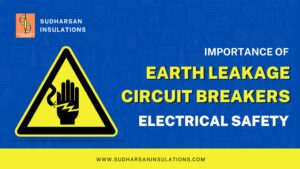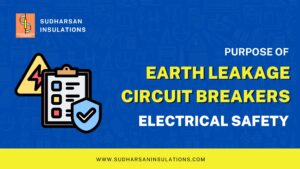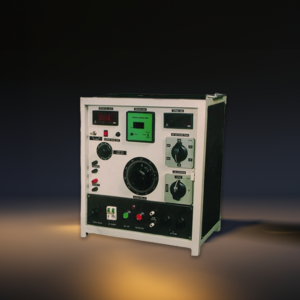Industrial Uses and Benefits of Earth Leakage Circuit Breaker (ELCB)
Last Updated : April 04, 2024

Industrial Uses and Benefits of ELCB
In industrial settings, ELCBs are essential for safety. They detect abnormal currents, preventing shocks and fires. Their swift response protects personnel and equipment, minimizing downtime and losses. ELCBs ensure compliance and sustained productivity, reflecting a commitment to safety and efficiency.
Definition and Purpose of Industrial Uses of ELCB
An Earth Leakage Circuit Breaker (ELCB) is a vital electrical safety device designed to protect industrial settings against electrical faults, such as earth leakage and short circuits. The principle objective for installing ELCB in the industry is to detect and de-energize any abnormal current flow that may result from faults associated with the power system, thus avoiding any accidents, equipment mishaps or fire hazards.
ELCBs undoubtedly are fundamental components of an industrial electrical installation as the primary function is to keep personnel and machinery safe. By providing this critical safety function, ELCBs play a crucial role in protecting industrial workers, machinery, and equipment from the dangers associated with electrical faults.These guards not only safeguard the life of workers but also keep an industrial system in safety and working perfectly, even without noticing. This goal is not driven only by the need to provide essential services but also to protect human lives and possessions as well as to uphold the stability of industrial operations within the changing industrial landscape.
Industrial Applications of ELCB
ELCBs are widely used in various industrial applications, including:
- Manufacturing Plants: ELCBs are essential in protecting machinery, equipment, and workers from electrical hazards in manufacturing facilities.
- Construction Sites: Temporary electrical installations on construction sites often require the use of ELCBs to ensure the safety of workers and equipment.
- Outdoor Installations: ELCBs are particularly important for outdoor electrical installations, where the risk of ground faults and leakage currents is higher due to moisture and environmental conditions.
- Hazardous Environments: In industries with potentially explosive atmospheres, such as chemical plants or oil and gas facilities, ELCBs are crucial for preventing electrical faults that could ignite flammable substances.
Maintenance and Testing of ELCB
Regular maintenance and testing of ELCBs are essential to ensure their proper functioning and maintain the safety of industrial electrical systems. Recommended practices include:
- Periodic Testing: ELCBs should be tested periodically, often on a monthly or quarterly basis, to verify their correct operation and trip functionality.
- Visual Inspections: Visual inspections should be conducted to check for any physical damage, corrosion, or other issues that may affect the ECB’s performance.
- Replacement: ELCBs have a limited lifespan and should be replaced according to manufacturer recommendations or after a specified number of operations.
- Record Keeping: Maintaining accurate records of ELCB testing, maintenance, and replacements is essential for ensuring compliance with safety regulations and standards.
Advantages & Disadvantages of ELCB
Advantages
- Provides protection against electric shocks and fires caused by ground faults or leakage currents.
- Enhances safety for personnel and equipment in industrial environments.
- Complies with electrical safety standards and regulations.
- Can be easily integrated into existing electrical systems.
- Automatic operation ensures rapid response to electrical faults.
Disadvantages
- ELCBs can sometimes trip unexpectedly because of electrical interference or sudden changes in electricity.
- Regular testing and maintenance are required to keep machines running correctly.
- Initial installation and replacement costs can be relatively high.
- ELCBs may not provide protection against certain types of faults, such as overloads or short circuits
To Know about other Products in Sudharsan Insulation. High Voltage Kits, Loading Transformers, Primary Current Injection Test Kit, Secondary Injection Kits, MCCB Kits, RCCB Kits.
Conclusion
ELCBs play a crucial role in industrial electrical safety, by detecting ground faults, and hence protecting against shocks and fires. Despite some of their limitations, they are a vital element in making up a complex safety plan.
Routine maintenance and testing are important for their dependability. Industries embracing electrical safety measures with ELCBs can look forward to improved safety of personnel, reduced downtime, and compliance with regulations which will result in the overall safety of the workplace.
Frequently Asked Questions about ELCBs
How often should ELCBs be tested?
ELCBs should be tested periodically, often on a monthly or quarterly basis, to ensure their proper functioning and trip functionality.
Can ELCBs be used in high-voltage applications?
Yes, ELCBs are available for high-voltage applications, but their specifications and ratings may differ from those used in low-voltage systems.
Do ELCBs provide protection against overloads or short circuits?
No, ELCBs are designed specifically to detect and interrupt ground faults or leakage currents. Protection against overloads and short circuits is typically provided by separate devices, such as circuit breakers or fuses.
Can ELCBs be used in outdoor installations?
Yes, ELCBs are particularly important for outdoor electrical installations, where the risk of ground faults and leakage currents is higher due to moisture and environmental conditions. However, appropriate weatherproof enclosures and proper installation practices should be followed.
Can ELCB be installed in existing industrial electrical systems?
Certainly. Yes, ELCB can be added to existing industrial electrical systems, but it must be done by qualified professionals to ensure compliance with safety standards and minimal disruption. Compatibility and load requirements
What steps should be taken if an ELCB trips frequently?
When your ELCB continues to trip off, you will need to take the next step and focus on troubleshooting the problem. Begin by checking appliances for problems, making the connections tight, and evaluating for electrical circulation that exceeds limits. As long as the problems continue, it is better to hire an electrician to analyze and solve them.




